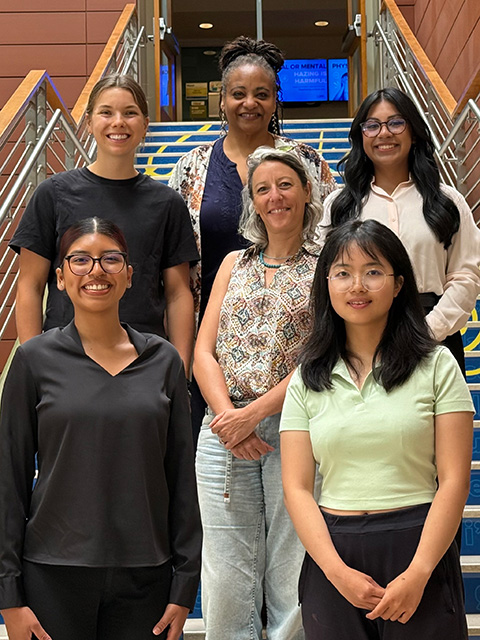
Undergrads push research in hemp, worms, soil and grain
PEAS fellows solve real-world problems in ag

Early career scientists are wrapping up a summer of research in the PEAS program, linking their undergraduate academic studies with real-world problems in service to California farmers.
PEAS fellows in the 2025 year are Chen Li, Princesa Ceballos Madrigal, Itzel Villagran and Morgan Wlaschin. The program is supervised by Amélie Gaudin, a professor in the UC Davis Department of Plant Sciences and Endowed Chair in Agroecology.
PEAS stands for the Plant, Environmental and Agroecology Sciences Fellowship. Its goal is to provide undergraduate students with mentoring, financial backing and professional connections to advance their work in the areas of agroecology, sustainable agriculture and related areas in social and biological sciences.
“The PEAS program has uniquely empowered undergrads to build their own research, designing and leading projects,” Gaudin said. “Our fellows have engaged deeply with real-world problems in partnership with University of California researchers, farmers and non‑profit leaders.
“Our first two cohorts show that we are creating successful and inclusive pathways in plant and environmental sciences,” Gaudin added. “I am looking forward to continue working with our students and partners to grow our impact.”
The PEAS Fellowship is hosted by the Department of Plant Sciences in partnership with the university’s Undergraduate Research Center.
“The PEAS Fellows participated in a spring seminar followed by a hands-on, 10-week summer program, where they connected with researchers, built community, worked with mentors and strengthened their professional and communication skills,” said Lolita Adkins, administrative director of the Undergraduate Research Center. “The experience culminated in a research symposium, where they presented their projects. It was impressive!”
Gaudin started the program in 2023 with a $20,000 grant from the Barbara D. Webster Scholar Award program. Since then, PEAS has received additional support from the Maxwell-Hanrahan Foundation and the University of California Office of the President.
This is the second year that PEAS Fellowships have been awarded. We asked this year’s fellows to tell us about their projects.

Chen Li: Sustainable hemp
Project: “Hemp grain and fiber performance across agroecosystems.”
Li is a fourth-year student majoring in biotechnology. She spent her summer exploring grain and fiber in field trials, with the aim of finding varieties for farmers that are more diverse and sustainable.
“I got into agriculture through my research on cannabis breeding,” Li wrote. “What keeps me inspired is knowing that the seeds I help develop might one day grow in fields far beyond my own.
“I love that research allows us to make tangible contributions that connect with communities and support real-world change.”
Princesa Ceballos Madrigal: Working on worms
Project: “Advancing agroecological pest nematode management practices through integrated field trials and ecosystem-based assessments.”
Ceballos Madrigal is a fourth-year student majoring in plant sciences. She’s looking for better ways to control nematodes – microscopic worms that attack crops.
“I’m from Porterville, Calif., where my interest in agriculture was shaped by my experiences growing up in a farmworker family,” Ceballos Madrigal wrote. “I saw firsthand the challenges and resilience within the industry.
“As a PEAS fellow, I’m excited to partner with Corteva Agriscience on pesticide trials that aim to improve crop health and contribute to more sustainable farming systems.”
Itzel Villagran: Healthy soil
Project: “Soil health at the UC Davis Student Farm.”
Villagran is a majoring in sustainable agriculture and food systems. Her work at the Student Farm, on the west side of campus, brings her into the world of small-scale, town-based agriculture.
“Being from an urban area in Los Angeles County, I’m passionate about making sustainable agriculture more accessible in cities like my hometown,” Villagran wrote. “As a PEAS fellow, I'm excited to research no-till practices at the UC Davis Student Farm to better understand their impact on soil health and potential applications in urban farming!”

Morgan Wlaschin: Low water & good grain
Project: “Identifying resilient wheat varieties to maintain high agronomic performance, nutritional composition and bread-making quality under drought conditions in Mediterranean-climate regions.”
Wlaschin is a fourth-year student majoring in sustainable agriculture and food systems. She’s interested in improving people’s health and maintaining a reliable food system, even as water grows scarce.
“I'm from Seattle, Wash., and I became interested in small cereal grains after working as a research assistant in the Grain Cropping Systems lab a year ago,” Wlaschin wrote. “There, I was fortunate to interact with passionate and knowledgeable individuals.
“My project aims to investigate the effects of water stress on the nutritional composition and baking quality of grain.”
Results: Confidence and belonging
In an anonymous survey, fellows from the 2025 cohort had this to say about their summer experience:
“This program shaped my confidence and sense of belonging in science. What stood out most was the supportive mentorship and community…It gave me the space to see myself as a future scientist, along with the tools and encouragement to make that vision real. That impact on confidence, identity and long-term motivation was just as valuable as the technical skills I gained.”
“The program offers a variety of support from mentors, alumni, graduate students, professors and more. It also helps boost students’ confidence and makes them feel welcome in a research role, regardless of prior experience.”
2024 PEAS fellows
The inaugural cohort of PEAS fellows did their projects in the summer of 2024. They are:
- Adazsofia Lengyel: “Rooting for health: Urban agriculture influence on soil ecosystem.”
- Sriram Srinivas: “Effects of cultural burning on soil carbon and microbial communities.”
- Lynnea Hanna: “Impacts of sheep grazing on plant community and soil microbiomes in riparian and adjacent agroecosystems.”
Related links
Learn more about PEAS -- the Plant, Environmental and Agroecology Sciences Fellowship -- and how to apply here.
Read about pioneering faculty member Barbara D. Webster here, and learn about the Barbara D. Webster Scholar Award here.
Media Resources
- Trina Kleist, UC Davis Department of Plant Sciences, tkleist@ucdavis.edu or (530) 601-6846 or (530) 754-6148.
